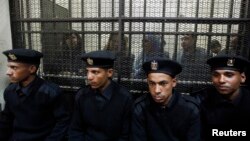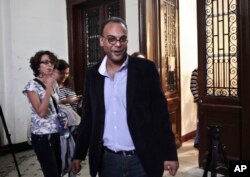Egypt has launched a new crackdown on human rights groups, questioning staff and ordering asset freezes over accusations they took foreign funding to destabilize the country after the 2011 uprising that ended Hosni Mubarak's 30-year rule.
Egyptian rights activists say they are facing the worst assault in their history in a wider campaign to erase the freedoms won in the 18-day revolt that began on Jan. 25, 2011.
Some say they are working from home in anticipation of arrests as the noose tightens on non-governmental organizations that have faced growing pressure since the burst of activism that accompanied the Arab Spring uprisings that toppled autocrats from Tunisia to Yemen.
It is not clear how many groups will be investigated in the case that has so far affected staff or management from at least six of Egypt's best-known rights groups.
They include Hossam Bahgat, founder of the Egyptian Initiative for Personal Rights (EIPR), and Gamal Eid, founder of the Arab Network for Human Rights Information.
An investigating magistrate has banned both men from traveling abroad and ordered their assets frozen pending an April 20 court decision. EIPR associate director Heba Morayef expects that freeze to be extended to the group as a whole, potentially forcing its office to close.
"I think some in the security agencies see human rights organizations as part of this global conspiracy to sow chaos, and that is actually in the asset freeze order," Morayef told Reuters. "This would be the biggest blow to human rights organizations in 30 years."
Egypt's Social Solidarity Minister Ghada Waly, who oversees the NGO sector in Egypt, did not respond to a written request for comment this week. There was also no comment from Egypt's prosecutors, who have banned reporting of the legal details of the case.
Since toppling elected president Mohamed Morsi of the Muslim Brotherhood in mid-2013, general-turned-president Abdel Fattah Sissi has overseen a crackdown on opposition in which hundreds of Brotherhood supporters were killed and thousands jailed.
The net has widened to include liberal and secular activists at the forefront of the 2011 revolt. Many are behind bars, charged with violating a 2013 law which prevents a repeat of the protests that helped unseat two presidents in three years.
Sissi portrays himself as a bulwark of stability in a region that has slipped into chaos since the 2011 revolts, prioritizing security over civil rights.
Under pressure
NGOs have felt exposed since late 2011, when authorities raided 17 pro-democracy and rights groups, accusing them of joining a foreign conspiracy against Egypt.
In 2013, a court ordered the closure of several foreign pro-democracy groups, including U.S.-based Freedom House, and gave jail sentences to 43 NGO staff including 15 Americans who had fled the country.
A case against dozens more Egyptian NGOs and lawyers was never closed but remained largely dormant until this year.
None of the NGO staff summoned for questioning have been formally charged. Egyptian law allows prosecutors to freeze assets, ban travel and remand suspects in custody for extended periods without charge. NGOs say they have received scant information on the investigation.
It is not illegal for NGOs in Egypt to receive foreign funding, according to Negad al Borai, a senior lawyer and anti-torture campaigner who is representing Behgat and others, but that funding may not be used for illegal activities, including those that undermine security.
According to a defense lawyer's written notes of the magistrate's asset freeze request memo, the groups in question saw a spike in foreign funding immediately after the 2011 revolt.
In the memo, the magistrate concludes that foreign funds were used to harm national security, destabilize Egypt and divide different social classes with the aim of "ensuring the failure of the Egyptian authorities."
"This all started because in 2011 ... the security agencies wanted to find an explanation for what happened on Jan. 25. So they said money came to the NGOs before January and this is the cause of what happened," said Mohamed Zaree, Egypt program manager at the Cairo Institute for Human Rights Studies (CIHRS).
"But what happened actually happened because of the interior ministry, because of torture, because of repression, because of the state of emergency," he added.
Zaree has not been summoned but two former staffers have, and CIHRS shifted its regional studies activities to Tunis in 2014 as the space for free speech shrank.
International criticism
The crackdown comes at a sensitive time for Egypt, which has been battling an Islamic State insurgency in northern Sinai and a weak economy.
It is keen to burnish its international image but has faced new criticism over human rights from the European Parliament since Italian student Giulio Regeni was murdered in Cairo in February.
U.S. Secretary of State John Kerry expressed concern last week over Egypt's decision to reopen its probe into the NGOs.
In February, authorities closed the Nadeem Center for the Rehabilitation of Victims of Violence and Torture and the dragnet has widened to include women's groups.
This week, the Nazra for Feminist Studies group saw three employees questioned. Its director, Mozn Hassan, has also been summoned.
"They want to stigmatize us," Hassan told Reuters. "They want to say publicly that those people are spies, that those people are not patriots."
Most human rights groups do not deny receiving foreign funds and say any move to freeze their assets or to close funding sources would severely limit their activities.
The campaign to curb NGO activities dates back almost as far as their establishment in the 1980s. NGOs had hoped the law would be reformed after 2011 to give them more freedom. Five years on, the NGO law is still in the works.
In the meantime, the Social Solidarity Ministry has ordered NGOs to register under a law that would give it ultimate control over their funding and activities.
Groups like EIPR say they have tried to register but faced bureaucratic obstacles. Most rights groups are instead registered as companies or law firms and say they work within the law.
"Their goal is to eliminate several organizations that have been outspoken in the past few years," EIPR founder Bahgat said. "I think this is not a bluff."








